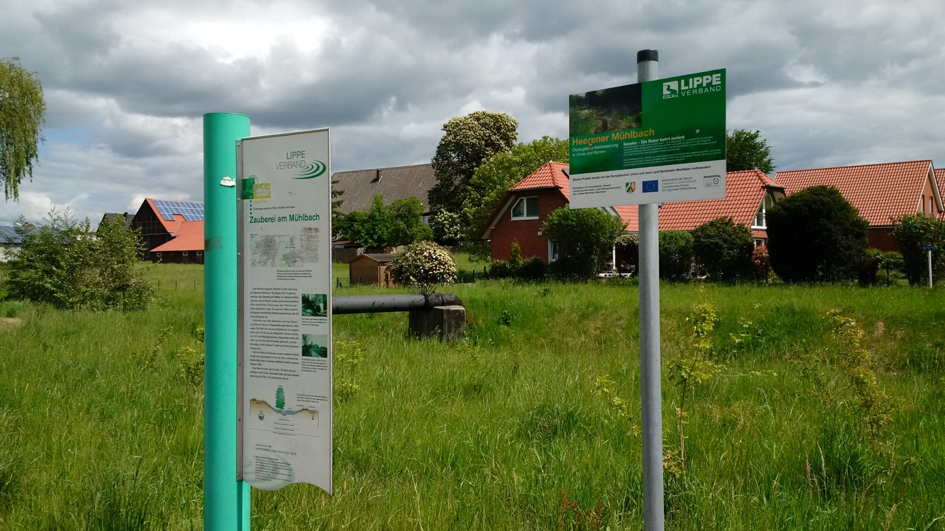Selection of no-regret adaptation measures
Infopoint at the water body accompanying cyclepath – displaying that an adaptation measure brings also benefits for recreation and residential environment
Source: Lippeverband
Given the many uncertainties associated with climate change, political and community support for so-called ‘no-regret’ adaptation measures can often be higher than for alternative approaches whose (cost-)effectiveness depends on the degree of future climate change. The no-regret approach focuses on maximizing positive and minimizing negative aspects delivered by EbA, and selecting actions that yield a range of benefits even in the absence of such change. In the case of the Kamen green-blue-corridor, the ecological improvement of the stream in combination with disconnecting the storm water from surrounding properties was determined to have positive impacts regardless of whether rainfall will increase in the long-term or not. Should rainfall intensify and become more frequent, flood risks will be reduced; if temperatures increase in the summer, the stored water will benefit the mircroclimate. Regardless of climate, however, the EbA measures can be considered as ‘no-regret’ as they create amenity and recreational benefits for the community and visitors, increase awareness levels, contribute to the EU Water Framework Directive and biodiversity conservation, and reduce water discharge fees for local inhabitants.
In order to gain political and public support for such measures, it is key to have sound scientific evidence of the potential benefits which can be created regardless of climate change and to compare these to other approaches. The outcomes of such comparative analyses can be disseminated via targeted awareness raising campaigns to highlight the potential environmental, societal and economic benefits and thereby foster greater recognition of the value of EbA, increase public support, and lead to
A range of obstacles can serve as potential barriers to implementing no-regret EbA actions, such as (i) financial and technology constraints; (ii) lack of information and transaction costs at the micro-level; and (iii) institutional and legal constraints (as outlined on the European Union’s Climate-Adapt platform). It is thus important to conduct assessments of the (cost-)effectiveness of the no-regret option as well as of other available measures in order to facilitate informed decision-making and steer appropriate communication campaigns. In Kamen, such comparative data was gathered and presented in group meetings and bilateral discussions to community members who were considering decoupling their rainwater from the sewage system. Given the reliance on private citizen support for a successful implementation, it was of particular importance to highlight the ‘no-regret’ character of the EbA measures alongside the personal benefits which could be expected.

